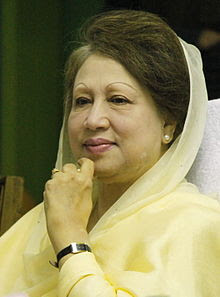Will Khaleda Zia’s India Visit Lead To Improved Ties? – Analysis
By Observer Research Foundation
By Joyeeta Bhattacharjee
Begum Khaleda Zia, the chairperson of the influential opposition Bangladesh Nationalist Party (BNP), is beginning an import visit of India from Sunday, October 28. A former Prime Minister who is not known to be friendly with India, Begum Zia is coming to New Delhi on the invitation of the Government of India.
The Government of India has rolled out a red carpet for Begum Zia. And has arranged meetings with top leaders of the Government. She will be calling on President Pranab Mukherjee, Prime Minister Dr. Manmohan Singh and also ruling UPA Chairperson Sonia Gandhi.

During the meetings with Indian leaders, Begum Zia is expected to raise issues of bilateral importance like the Teesta Water Agreement, Land Boundary Agreement, the Tipaimukh issues, trade deficit, etc.
Considering the internal political dynamics of Bangladesh, this first visit of Begum Zia as the leader of the opposition is very significant. While traditionally, the Awami League, which is in power now with Sheikh Hasina as the Prime Minister, is known to be friendly towards India, its rival the BNP, which were in power thrice at Dhaka, is known for its reservations towards India.
The visit, the first by Begum Zia as an Opposition leader, suggests a change in the thinking of her party. And it is likely to turn into a major breakthrough in the India-Bangladesh relations, marking a new beginning in the relations.
India’s motivation for reaching out to the BNP is aimed at maintaining the present momentum in the bilateral relation, especially the security cooperation that has been a major success during the past few years. The relationship between the two countries has seen major progress after the Awami League came in to power in 2009. It was with the help from Bangladesh that India could check insurgency in the North East, with the detention of many top leaders of various insurgent groups who were running their subversive activities across from the border. They included the self-proclaimed chairman of the United Liberation Front of Assam, Arabinda Rajkhowa and the chief of the National Democratic Front of Bodoland, Ranjan Daimary. India fears that a change of regime in Bangladesh might hamper the security cooperation, impacting on the internal security scenario.
Bangladesh is likely to go to polls late 2013 or early 2014. The term of the present government ends in January 2014. The history of elections in that country shows that no party has returned to power for a consecutive second term. This has added to India’s worry. Trends now suggest that the popularity of ruling Awami League is dwindling fast due to various allegations of corruption and governance issues.
The visit provides opportunities for both parties to break the past prejudices and mend fences, laying a bond to bring people of both countries closer to each other. It could also lay foundation for a lasting and stable relationship which will be a model for other countries of South Asia, creating an atmosphere for cooperation in fighting common challenges of poverty, hunger and unemployment.
(Dr. Joyeeta Bhattacharjee is an Associate Fellow at Observer Research Foundation)
